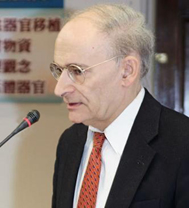David Matas
大衛.麥塔斯 律師
2006年被加拿大「多信仰兄弟會」社團評為「年度偉大人物」。2008年獲得加拿大總督頒發「加拿大勳章」(Order of Canada),表彰大衛‧麥塔斯在過去30年來不斷致力於捍衛社會最弱勢群體權利的努力。被公認在人權、移民和難民法律事務做出卓越貢獻及巨大影響力的人權專家。
2010年大衛‧麥塔斯與加拿大前亞太事務司司長大衛‧喬高(David Kilgour),因調查中共活摘法輪功修煉者器官並在全世界範圍揭發和制止中共血腥器官摘取所做出的不懈努力,被提名諾貝爾和平獎候選人。2010年11月被加拿大政府任命為國際人權及民主發展中心董事會董事。
榮譽:
1992年獲州聯邦獎; 1995年歐洲退役軍人慶祝猶太戰爭勝利15週年紀念獎;
1996年獲托巴省權利與自由組織卓著成就獎;
1996年Concordia大學榮譽法學博士;
1997年獲加拿大Shaare Zedek醫院基金會的Percy Barsky醫生人道主義獎;
1997 年獲國家猶太婦女委員會(溫尼伯部份)的百年社區服務獎;
1997年蒙特利爾Honouree 的釋法會首席法官;
1999年加拿大B'nai Brith人權同盟中西部地區人權成就獎;
1999年托巴省公共法律教育委員會人權成就獎;
2004、2005年加拿大B'nai Brith 總統獎;
2006年溫哥華多種信仰團體友好人。
1992年獲州聯邦獎; 1995年歐洲退役軍人慶祝猶太戰爭勝利15週年紀念獎;
1996年獲托巴省權利與自由組織卓著成就獎;
1996年Concordia大學榮譽法學博士;
1997年獲加拿大Shaare Zedek醫院基金會的Percy Barsky醫生人道主義獎;
1997 年獲國家猶太婦女委員會(溫尼伯部份)的百年社區服務獎;
1997年蒙特利爾Honouree 的釋法會首席法官;
1999年加拿大B'nai Brith人權同盟中西部地區人權成就獎;
1999年托巴省公共法律教育委員會人權成就獎;
2004、2005年加拿大B'nai Brith 總統獎;
2006年溫哥華多種信仰團體友好人。
2006年加拿大「多信仰兄弟會」社團評為「年度偉大人物」。
2007年加拿大律師協會(CBA)頒發年度塔爾諾波爾斯基(Tarnopolsky)人權獎。
2007年加拿大律師協會(CBA)頒發年度塔爾諾波爾斯基(Tarnopolsky)人權獎。
2008年獲加拿大平民最高榮譽——「加拿大勳章」(Order of Canada)。
2010年與大衛‧喬高(David Kilgour),被提名諾貝爾和平獎候選人。
著書:
1986年《加拿大移民法》;
1987年與Susan Charendoff 合著《耽擱的正義:加拿大納粹戰犯》;
1989年《聖所試驗》;
1989年與Ilana Simon合著《大門正在關閉:難民保護的失敗》;
1994年《反對人權侵害的鬥爭不再》;
1995年與美國國際特赦組織共同編輯《死亡機器》;
2000年《血字: 怨恨和言論自由》;
2005年《震驚之後: 反猶太復國主義和反猶太主義》;
1986年《加拿大移民法》;
1987年與Susan Charendoff 合著《耽擱的正義:加拿大納粹戰犯》;
1989年《聖所試驗》;
1989年與Ilana Simon合著《大門正在關閉:難民保護的失敗》;
1994年《反對人權侵害的鬥爭不再》;
1995年與美國國際特赦組織共同編輯《死亡機器》;
2000年《血字: 怨恨和言論自由》;
2005年《震驚之後: 反猶太復國主義和反猶太主義》;
2009 年《血腥的器官摘取》,為作者之一
Prevention and cure: Organ Transplant Abuse - New Developments
David Matas (Canada)
Research in reports published in June 2006, January 2007, and in the book Bloody Harvest, November 2009 all of which I co-authored with David Kilgour and in the book State Organs August 2012 I co-edited with Torsten Trey concluded that the bulk of organs for transplants in China come from prisoners of conscience, mostly practitioners of the spiritually based set of exercises Falun Gong. Ethan Gutmann, in a chapter published in State Organs, presents research showing that there are other transplant victim prisoners of conscience - Uighurs, Tibetans and Eastern Lightning House Christians.
One reason, amongst many, that David Kilgour and I came to the conclusion we did is that the precautions which should be in place to prevent the abuse were not in place. After the first version of our report, we launched on a global advocacy campaign to attempt to end the abuse we had identified. The book State Organs is a reflection and continuation of that campaign by joining together professionals from around the world, each making their own contribution to the ongoing effort.
Since the release of the first version of our report, more than six and a half years have passed. In the intervening period, much has changed, and not always for the better. This lecture will focus on the changes both in China and abroad, both to prevent the continuation of the abuse and to remedy the wrongs which have existed.
The lecture then will have four components - changes abroad and changes in China, and for each prevention and remedy. The lecture will examine changes in the law, policy, professional ethics and practice.
The general conclusion will be that abroad there has been a number of preventive changes in law, policy and practice. The changes though have been mostly fledging and tentative. A good deal still remains to be done. The most significant and positive changes have occurred in professional ethics.
The search for remedies has been frustrating. Remedies for the wrongs inflicted are still in their infancy.
For China, there is both progress and retrogession. The killing of prisoners of conscience in the intervening period has increased as the death penalty volumes have gone down while transplant volumes have remained constant. Compliance with the World Health Organization principles of transparency and traceability recedes further and further. China is involved in an active, persistent cover up of information about sourcing of organs.
On the positive side, China has set up an organ donor system, is now giving preference to its own nationals over foreigners as organ recipients, and has set up a system of hospital registration limiting the hospitals which can engage in transplants. There have been sporadic efforts to crack down on organ transplant abuse. There appears to be some players within the system, though not enough, who are attempting to bring China round to international standards.
In general, though in the intervening six and a half years, much has changed, we are still faced with the continuation of the abuse. The onus lies on China to account for its organ sourcing, not on outsiders to show that this sourcing is improper. As the years go by, this accountability seems increasingly unlikely as bits and pieces of information within China which were previously available, are systematically made to disappear.






